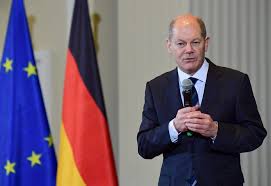Germany’s domestic security agency has sounded the alarm on rising threats from terrorist organizations sneaking in with Ukrainian refugees. This conveniently timed report comes as Europe grows increasingly anti-immigrant, wrestling with security and economic woes these newcomers bring.
It’s a clear sign that support for Ukrainians is waning. The harsh reality is sinking in: Europe, the US, and Ukraine will not be able to outmatch Russia after all. So, Europe is subtly shifting gears, focusing on fortifying its borders.
Germany’s domestic security agency, the BfV, has issued a dire warning about jihadists masquerading as Ukrainian refugees. Yes, the Afghanistan-based offshoot of the once-terrifying Islamic State, now cozily called ISPK by German intelligence, has managed to infiltrate Western Europe. How? By hopping on the same refugee wave as those fleeing the turmoil in Ukraine. Director General Thomas Haldenwang made this revelation with a straight face, suggesting these terrorists are now nestled comfortably in various European countries.
In an annual report that reads like a thriller novel, Haldenwang and Interior Minister Nancy Faeser shared tales of a July 2023 operation that resulted in a series of dramatic arrests in Germany and the Netherlands. Nine individuals from Central Asia were caught for allegedly founding a “domestic terrorist group” and plotting major attacks on European soil. Seven of these miscreants were enjoying the German hospitality. These suspects, described by German officials as “black sheep” among Ukrainians, have ties with ISPK and conveniently entered the European Union almost simultaneously from Ukraine, according to Germany’s security agency.
So, while Europe was busy patting itself on the back for its generous open-door policy for Ukrainian refugees, it seems they also rolled out the red carpet for a few terrorists. European security services are on high alert, fearing these groups might bring their violent agenda to European soil. Despite a few foiled plots linked to ISIS-K supporters in Europe, the continent remains jittery.
Amid these thrilling security tales, let’s not forget the growing anti-immigration sentiment sweeping through Europe. The once-compassionate embrace of Ukrainian refugees is now a lukewarm handshake at best. Economies across Europe are already buckling under the weight of sanctions against Russia, pushing public services, welfare systems, and job markets to the brink. Governments are nervously eyeing the financial burden of providing housing, healthcare, and education to a seemingly endless stream of refugees.
The political landscape isn’t much rosier. Immigration remains a hot-button issue, with populist and nationalist parties fanning the flames of anti-immigrant sentiment. Integration is another buzzword that gets tossed around like a hot potato. Europe has had its fair share of struggles integrating past waves of immigrants, leading to social tensions and cultural clashes. The prospect of successfully integrating a large number of Ukrainian refugees seems daunting, with language barriers, and cultural differences.
Then there are the security concerns, the fear of potential criminal activity or terrorism linked to new immigrants shapes public opinion and government policies. The idea of maintaining cultural homogeneity also plays a role. Europe is realizing that large-scale immigration threatens their national identity and social cohesion.
As Germany initially rolled out the welcome mat for Ukrainian refugees, the reality of growing resistance is now unavoidable. Moscow, pointed fingers at GUR, suggesting that Ukrainian intelligence services had a hand in the Crocus City Hall attack that killed over 145 people. ISPK, according to Russian officials, had only lent its brand to the plot, aiding the real masterminds in recruiting the perpetrators. Terrorists once used by GUR to strike Russia are now ringing Europe’s doorbell, alarming threats in the continent.
The BfV’s report, a hefty tome of over 400 pages, covers an extensive range of threats, from foreign espionage to domestic extremism and terrorism. With jihadist terrorist organizations’ strength estimated at 27,200 people, this report seems a timely manoeuvre to counter the rising immigration in Europe. Recent EU elections have also shown a surge in right-wing party support and a waning enthusiasm for leftist parties that welcomed Ukrainian immigrants with open arms in 2022. This move is aimed at rallying the anti-immigration crowd, signaling a shift in support away from Ukraine. Slowly but surely, Europe seems to be pulling back its support to Ukraine, perhaps realizing that defeating Russia might not be in the cards.
In conclusion, while Germany and Europe grapple with the complexities of immigration and security, the once-warm embrace for Ukrainian refugees has cooled significantly. The continent faces a delicate balancing act, where Ukraine is bound to fall off the rope.








